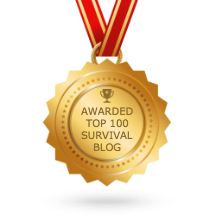72 Hour Kits and Disaster Kits For Babies
If you have an infant or a toddler at home, consider including these items as you put together your disaster and 72 hour kits for your family:
Instant formula. Make sure to buy the kind you do not need to mix with water. Also, track expiration dates and rotate through them frequently.
5 small bottles for the formula. You can fill them with purified water to provide extra drinking water in your kit.
Refrigerated bottle bag. This is helpful in case you get the chance to warm up or cool down the formula you can keep it at that temperature for around 4 hours.
Plenty of diapers. The exact number needed depends on the age of your child. I recommend including about 20 disposables and also 3 cloth ones that can be washed, dried and reused in case you run out.
A travel package of wipes. These are great for washing as well. If you have space I'd recommend just storing a full box of wet wipes.
Pacifiers. Put in two just in case. If you're stressed the baby will probably be stressed and it's a comfort for them.
3 cotton/flannel wraps, and 2 muslin wraps.
Baby food. Depending on the age of your child you will probably want to include some jars of baby food. Once your baby can eat mostly regular foods just pop these out of your kit.
Washcloths. Stored around 10 small ones, it's an eventuality, you'll require them at some point.
Small comfort toy/s. If you child has a specific toy or blanket that he/she really loves, try to grab that in an emergency. But if you can't, then try to have a usable substitute that will help comfort the child in lieu of their favorite item.
Clothes - and plenty of them! This is a tough one as babies grow so fast. One trick I recommend is that as you swap out their closets to put in the next size of clothes to remember to do that in the disaster kit at the same time. Make sure to include clothes for all types of weather and include lots of spares.
Ziplock bags. These work great for storing used diapers or anything else that is dirty, or clean for that matter.
Bulb nose syringe and saline. Saline loosens mucous and syringe sucks water/mucous/misc out of ears, nose, mouth etc. You never know if you'll need one so it's great to keep in your kit.
Infant tylenol/motrin. It never fails that kids get sick as soon as you are somewhere WITHOUT your medicine. So this is a definite requirement for any child disaster kit.
Desatin or other diaper rash cream and travel-sized baby powder. The last thing you'd want in an emergency situation is a sore bum and nothing to treat it with. This will be especially useful if you have to resort to using cloth diapers.
The most important thing to remember is to always be thinking about what is appropriate for your child's age and stage of development. For example, if your child is no longer drinking bottles then there is no reason to keep formula in your disaster kit.
Wednesday, October 30, 2024
Subscribe to:
Post Comments (Atom)
Affiliate Disclosure: I am grateful to be of service and bring you content free of charge. In order to do this, please note that when you click links and purchase items, in most (not all) cases I will receive a referral commission. Your support in purchasing through these links enables me to share more information and get closer to getting my family totally off-grid and on our own piece of land. This will let me share more and more information to allow , hopefully, for you to become more self-sufficient and able to become more prepared by reading my blog and purchasing items that I share with you that will help you. Thank you! :)





0 comments:
Post a Comment